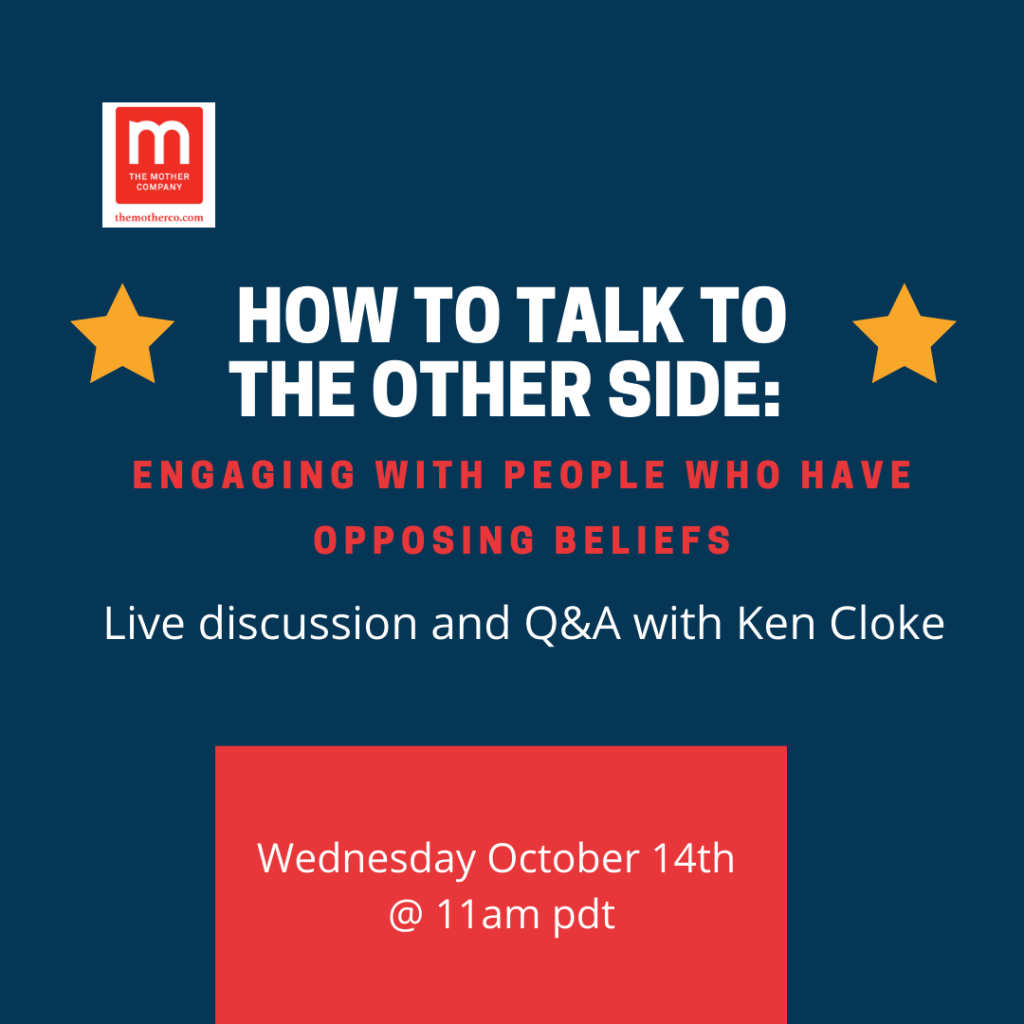How to Talk to the Other Side: Live Discussion and Q&A with Ken Cloke
Partisian divides. Difficult in-laws. Toxic exes. Defiant teens. Terrible bosses. These days, seems like we are surrounded by people who push our buttons and drive us to the brink. Let’s learn how to have important discussions without blowing up, writing off, and backing down with a master moderator, Ken Cloke.
Ken Cloke is a world-recognized mediator, dialogue facilitator, conflict resolution systems designer, teacher, trainer, author and public speaker. He has been a pioneer and leader in the field of mediation and conflict resolution for the last 37 years.
Part of The Mother Company’s series on Parenting in a Pandemic.
GOING DEEPER:
A Transformational Approach to Conflicts
Between Police, Demonstrators, and Communities of Color
By Kenneth Cloke, www.kencloke.com
Police everywhere receive extensive training in using rifles, pistols, tasers, and clubs. How much training do they receive in non-violent communication, de-escalation, collaborative negotiation, and mediation?
Every officer learns to use violence and the martial arts. How many learn empathy, compassion, and emotional intelligence?
Police in all communities are taught to recognize and respond to aggression, but how many are taught to recognize and respond to systemic racism or sexism? How many know how to express empathy, or when to refuse an order, or how to apologize or forgive? All are trained in the letter of the law, but how many understand its spirit, or its relationship to justice?
Throughout history, police have played mixed and complex roles. One has been to maintain “law and order,” which has meant keeping Blacks and Browns, feminists, gays, organized labor, and all discriminated and oppressed people in their place — quiet, subordinate, and obedient to those who stand over and above them, by periodically applying a knee to their necks.
It is time to take a transformational, systemic approach to chronic conflicts between police, political demonstrators, and communities of color. What might this approach look like?
There have been numerous calls to abolish or defund police departments, but it is not entirely clear what this would entail, other than rebuilding, as in Camden, New Jersey. A transformational approach to policing would seek to:
- Strengthen non-violent communication, collaborative negotiation, and mediation skills, with a focus on prevention;
- End mass incarceration and imprisonment through house arrest and “pay for law-abiding’ programs;
- Decriminalize sex work, addiction, homelessness, drug use, and consensual, victimless “crimes”;
- Provide counseling, housing, guaranteed annual incomes, community-based drop-in centers, integrated assistance, and social and health services for those in need;
- Adopt a non-confrontational, constitutionally supportive approach to political demonstrators, rather than banning, blocking, beating, or tear-gassing them, which routinely provokes violence rather than preventing it;
- End the use of police to dominate and suppress those who object to being discriminated against and treated unfairly by protecting and taking the side of those who discriminate;
- Defund and dismantle the war culture and weaponry of police departments, which treats demonstrators and communities of color as the enemy, and support peace-building and de-escalation.
As mediators, dialogue facilitators and conflict resolution systems designers, we have had decades of experience addressing these issues in a variety of settings, and can propose options, based on these experiences. For example, here are ten:
- That all police and community leaders be trained in non-violent communication, collaborative negotiation, public dialogue facilitation, and restorative justice — and paid to mediate disputes, rather than assume that violence is the only method for solving problems;
- That police and cities publicly apologize for past incidents of racial discrimination, and for failing to listen to and negotiate with demonstrators and minority communities before resorting to unnecessary force, violence and coercion;
- That police and cities invite the public to participate in regular facilitated dialogues on police/community relations to discuss what has happened in the past and invite recommendations for change;
- That cities create multi-stakeholder “Blue Ribbon” commissions and on-going police review boards, and work with police unions to assess what has happened in police/community relations and why, and correct it;
- That police and cities declare a policy of using violence only as a last resort, disarm patrol officers, and commit publicly to first and primary use of non-violent methods;
- That police and cities recognize the need to develop a completely different culture, approach, and attitude toward policing that is less confrontational and discriminatory toward communities of color, and more collaborative, humane, and egalitarian;
- That all cities establish, increase funding, and prioritize programs in restorative justice, victim/offender mediation, and community mediation;
- That all police teams include at least one “good cop” who has been extensively trained in mediation, negotiation, and the art of listening;
- That community mediation programs be funded to train police and other city departments in bias, prejudice, and stereotyping; and to build the skills and capacities of social justice organizations, community policing programs, police review boards, and neighborhood watch participants in conflict resolution, consensus building and problem solving;
- That cities initiate a conflict resolution systems design process to identify the sources of chronic conflict involving the police and criminal prosecution, and propose alternatives, such as mediation, restorative justice, sentencing circles, and Multi-Door Courthouses.
These are just a few ideas out of hundreds that might emerge from police/community dialogues. What matters now is that we take advantage of this opening to change and propose new ways of extending egalitarian, democratic, mediative principles to the entire system and culture of policing. To do so, we require sustained efforts at improvement, the election of courageous political leaders from top to bottom, and a determination to build the skills we all need to build an authentic, substantive, engaged and humane democracy.
Ken Cloke is a world-recognized mediator, dialogue facilitator, conflict resolution systems designer, teacher, public speaker, author of numerous books and articles, and a pioneer and leader in the field of mediation and conflict resolution for the last 37 years.
The Mother Company has been supporting families with award-winning content for over a decade, offering expert resources for parents and teachers, books and television shows for toddlers through teens, live family events, and more. With everything we do, we aim to make parenting – and growing up – a more connected, more enjoyable, and less stressful experience. We are Helping Parents Raise Good People.
Posted in: Expert Advice, Parenting Events


